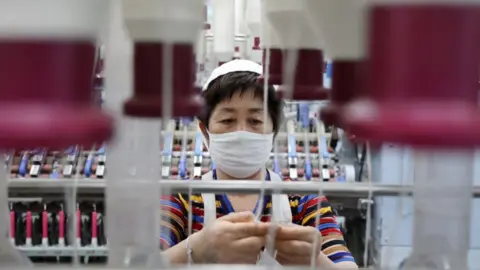China exports see biggest drop for three years
 Getty Images
Getty ImagesChina's imports and exports fell more sharply than expected last month as weaker global demand threatened the recovery prospects of the world's second-largest economy.
Official figures show that exports fell by 14.5% in July compared with a year earlier, while imports dropped 12.4%.
The grim trade figures reinforce concerns that the country's economic growth could slow further this year.
It will increase pressure on Beijing to help boost the post-pandemic recovery.
China's economy grew just 3% last year - apart from the slowdown when Covid struck, the weakest rate since 1976 - reflecting the toll from coronavirus restrictions that remained some of the most stringent in the world, long after many other countries had resumed more normal patterns.
A full lockdown was imposed for two full months from March 2022 in the financial hub of Shanghai, home to around 25 million people, with the government delivering food packages to residents confined in their home.
Though officials loosened restrictions in November, recovery has remained lacklustre.
The unemployment rate among China's youth exceeded 20% in May and a crisis in the housing sector has damaged confidence.
Weaker economic growth overseas has also reduced foreign demand for Chinese goods, while geopolitical tensions between China and the US and others have taken a further toll on trade, encouraging international firms to shift investments out of the country.
July was the third month in a row that China's shipments overseas have declined, marking the sharpest fall since February 2020 at the height of the pandemic.
Exports to the US, one of China's biggest buyers, fell 23.1% year-on-year.
The European Union also bought 20.6% less from China.
Louise Loo from Oxford Economics warned that the pressures on foreign trade will linger, as higher borrowing costs and rising living costs weigh on economic activity in other parts of the world, eroding demand for goods.
"The backdrop for China's external demand could become considerably more challenging in the coming quarters," she said.
China's position as a major importer also means its sluggish trade performance is likely to have a knock-on effect on the global economy, said Steve Clayton, head of equity funds for investment firm Hargreaves Lansdown.
Prices for commodities from oil to copper slipped in response to the news, while shares in luxury goods producers such as LVMH - which have long looked to China for growth - also dropped.
"A weaker China means lower demand in the wider global economy too," Mr Clayton said. "China's woes may well be felt beyond its own shores, underlining the interlinkage of the world's leading economies."
China's central bank has cut interest rates in recent months in a bid to boost the economy and regulators have also relaxed their scrutiny of key sectors such as the tech industry. But officials have so far resisted major measures to stimulate the economy.
Weak growth means China is not facing the rising prices that have rattled many other countries and prompted central bankers elsewhere to sharply increase borrowing costs.
